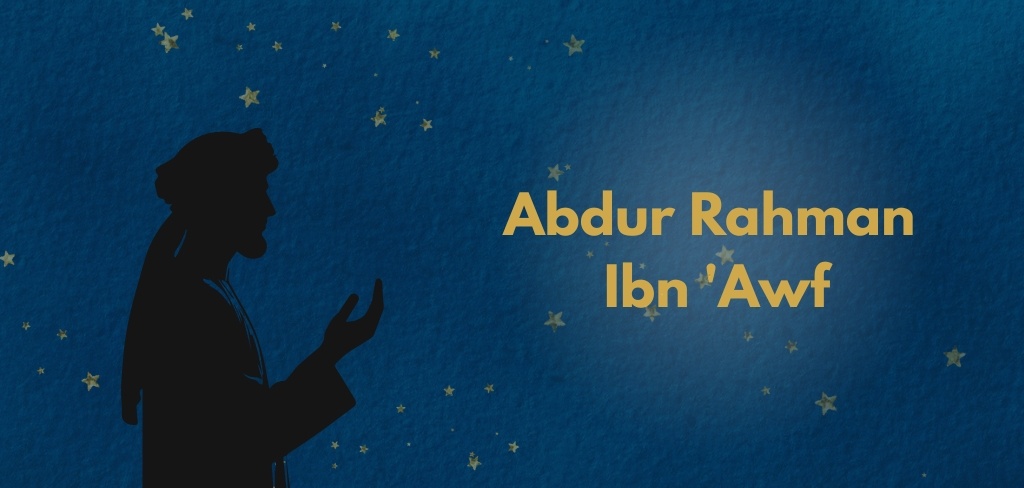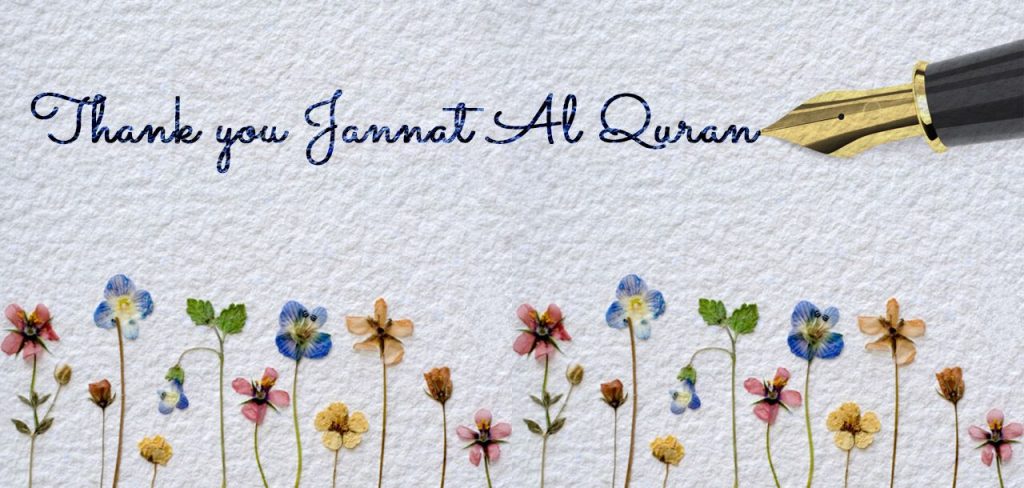The Prophet Muhammad (ﷺ) said “Abu Bakr is in Paradise, Umar is in Paradise, Uthman is in Paradise, Ali is in Paradise, Talhah is in Paradise, Az-Zubair is in Paradise, Abdur-Rahman bin Awf is in Paradise, Sa’d bin Abi Waqqas is in Paradise, Sa’eed bin Zaid is in Paradise, and Abu Ubaidah bin Al-Jarrah is in Paradise.” The Prophet Muhammad (ﷺ) witnessed his truthfulness and religion when he said he is in Jannah, he was given the title of ”The servant of the Beneficent God”, he was a courageous and ascetic person who rejected the Khilafah twice, and he is Abdur-Rahman bin Awf. He was one of the first eight people to accept Islam. He was one of the six persons chosen by Sayyiduna Umar to form the council of Shura to choose the Khalifah after his death. He was rich but content, and a skillful merchant. He made Hijra 3 times. His full name was Abdur-Rahman ibn Awf ibn Abd Awf ibn Abdul Harith ibn Zuhrah ibn Kilab. He was called Abdu Amr, but the Prophet Muhammad (ﷺ) changed it to Abdur-Rahman. He was born ten years after the Year of the Elephant (ʿĀm al-Fīl), making him about ten years younger than the Prophet Muhammad (ﷺ). It is reported that he said:
”My name was Abd Amr. As soon as I embraced Islam, Rasulullah salla Llahu ‘alayhi wa sallam named me ‘Abdur Rahman.”
His islam and hijrah
He embraced Islam at the hands of Sayyiduna Abu Bakr (RA), who was calling those close to him to Islam. At that time, Abdur-Rahman bin Awf (RA) was around thirty years old. He was well known among his people for being a generous man and a skillful merchant, qualities that remained with him throughout his life. After accepting Islam, he also invited his brother Al-Aswad ibn Awf to the faith. Like all of the early Muslims, Sayyiduna ‘Abdur-Rahman ibn ‘Awf (RA) was not spared from persecution for choosing Islam. The leaders of idolatry in Makkah tortured the believers, preventing them from practicing their faith and worshiping Allah freely. Due to this continuous and unbearable persecution, ‘Abdur-Rahman ibn ‘Awf decided to migrate to Abyssinia. Later, when rumors spread that Muslims in Makkah were no longer mistreated, he returned. However, upon arrival, he and the others discovered that the news was false. He then made Hijrah to Abyssinia once again, seeking safety for his faith.
When the command of migration from Makkah to Madinah was revealed to the Prophet Muhammad (ﷺ), Sayyiduna ‘Abdur-Rahman ibn ‘Awf (RA) was among those who made Hijrah. Soon after the Prophet’s arrival in Madinah, he established bonds of brotherhood between the Muhājirīn (emigrants) and the Ansār (helpers). The Prophet (ﷺ) paired Abdur-Rahman ibn Awf with Sa’d ibn al-Rabi al-Ansari (RA). Sa’d offered to share half of his wealth and even his family responsibilities with him. But Abdur-Rahman (RA) politely declined, saying:
“May Allah bless you in your family and your wealth. Just show me the marketplace.”
He then began trading with simple goods, and his profit was curd and butter, and from this humble beginning, Allah placed great Barakah in his efforts, making him one of the most successful merchants in Madinah.
Abdul-Rahman ibn Awf’s Generosity
Sayyiduna Abdur-Rahman bin Awf served Islam with his wealth, which was no less than what he sacrificed for the sake of Islam in the battlefields in the Battle of Badr and Uhud. Abdur-Raḥmān ibn ʿAwf (may Allah be pleased with him) used to give Allah a goodly loan, so Allah multiplied it for him many times. Once, he sold a piece of land for forty thousand dinars, and he distributed all of it among his relatives from Banū Zuhrah, the Mothers of the Believers, and the poor Muslims. He also presented five hundred horses for the armies of Islam, and on another occasion, one thousand five hundred camels. At his death, he bequeathed fifty thousand dinars in the path of Allah, and four hundred dinars for each of those who remained alive from among the people of Badr — until the share of the caliph ʿUthmān reached him. He took it and said:
”The wealth of ʿAbdur-Raḥmān is pure and wholesome, and eating from it is safety and blessing.”
While Lady Ayishah (may Allah be pleased with her) was in her house, she heard a noise that shook Madinah. She asked: ‘What is that?’ They said: ‘A caravan belonging to Abdur-Raḥmān ibn Awf has arrived from al-Shām, consisting of seven hundred camels.’ Lady Ayishah said: ‘Indeed, I heard the Messenger of Allah ﷺ say:
”I saw Abdur-Raḥmān ibn Awf entering Paradise crawling.”
When this reached Abdur-Raḥmān, he went to her and asked her about what had been conveyed. She narrated it to him, so he said:
”I make you witness that it — with all its loads — is for the sake of Allah, the Mighty and Majestic.”
The generosity of Abdur-Rahman ibn ‘Awf reached such an extent that it was said:
”All the people of Madinah were partners with Ibn ‘Awf in his wealth: one third he would lend them, one third he would use to pay off their debts, and one third he would give them in charity and gifts.”
Abdur-Rahman ibn ʿAwf during the era of the Rightly Guided Caliphs
Abdur-Raḥmān ibn Awf held a great position during the era of the Rightly Guided Caliphs, especially in the time of Umar ibn al-Khaṭṭāb, who would often consult him. When the plague of ʿAmwās occurred in the year 18 AH and spread through the lands of al-Shām, Umar ibn al-Khaṭṭāb intended to travel there. But when he reached Sargh, news reached him that the epidemic had broken out in al-Shām. Abdur-Raḥmān ibn Awf advised him with the prophetic saying:
‘If you hear of this plague in a land, do not enter it; and if it occurs in a land while you are there, do not leave fleeing from it.’
So Umar and his companions returned to al-Madīnah al-Munawwarah.
The death of Abdur-Raḥmān ibn Awf
Shortly before his death, he bequeathed fifty thousand dinars in the way of Allah. From this, each man would be given a thousand dinars. As for his wives, each of them received eighty thousand dinars from his estate. He also willed that every surviving participant of the Battle of Badr be given four hundred dinars; they were one hundred in number, and they took it—including ʿUthmān ibn ʿAffān, who accepted it out of respect for him, despite being the Caliph. It was narrated that Abdur-Raḥmān ibn ʿAwf (may Allah be pleased with him) was brought food while he was fasting. He said:
”Muṣʿab ibn ʿUmair was martyred, and he was better than me. He was shrouded in a cloak: if his head was covered, his feet were exposed, and if his feet were covered, his head was exposed. And Hamzah was martyred, and he was better than me. Yet, we have been granted from this world what we have been granted, and I fear that our good deeds have been hastened for us (in this life).’ Then he began to weep until he left the food.”
Abdur-Rahman ibn Awf passed away in the year 32 AH, during the caliphate of Uthmān ibn Affān. Countless lessons and values can be drawn from the noble life of Sayyidunā Abdur-Raḥmān ibn Awf (may Allah be pleased with him). Among the most precious of these is the lesson of renouncing the glitter and glamour of this fleeting world, and instead turning wholeheartedly towards Allah.


